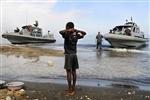Haiti: President admits lack of coordination
 Haitian President, René Préval, has admitted that the government’s response to the earthquake that devastated the country last week has been poor.
Haitian President, René Préval, has admitted that the government’s response to the earthquake that devastated the country last week has been poor.
In an interview with the Spanish daily El Pais, Préval said that his government is starting to exercise some control over the situation and rejected accusations that he had been absent while thousand of his compatriots were demanding emergency help. “During the first night I visited the city to assess the effect of the earthquake. Every day I go out to evaluate the damage”, he said.
Préval said that his government will help those who want to settle outside the capital and rejected the idea that the heavy presence of US troops amounts to colonialism.
Port-au-Prince port, back in business
The reopening of the Haitian capital’s port has renewed hopes that much more of the emergency aid will reach its intended beneficiaries.
An important part of the port was destroyed by the earthquake, with cranes and containers floating out into the sea, making it impossible for ships to reach the pier.
Army and navy divers from the US have been working to repair the port and make it operative. Most of the aid tarriving by sea is driven to the airport, from where it is distributed to the victims of the earthquake.
Thousands to be relocated
 Thousands of people who lost their homes after last week’s earthquake will be relocated outside the Haitian capital.
Thousands of people who lost their homes after last week’s earthquake will be relocated outside the Haitian capital.
It is believe that at least one million and a half people have been left homeless. The authorities also say that many people are leaving Port-au-Prince to escape from an epidemic of dengue and typhus, caused by hundreds of rotting bodies.
President Préval has said that his government will assist those who want to relocate outside the capital. The government will provide free buses but nobody knows when.
Those willing to leave need to do it soon, because the first heavy rains will arrive within a few days, making it very difficult for those who want to move to the countryside to use the almost destroyed roads that lead to the Haitian peninsula.
El Pais (Spanish)
http://www.elpais.com/articulo/internacional/Hay/falta/general/coordinacion/empezamos/tomar/control/elpepuint/20100122elpepiint_2/Tes
BBC News
http://news.bbc.co.uk/1/hi/world/americas/8473906.stm
Peru: Shinning Path followers form political party
 The lawyer of Abimael Guzman, the incarcerated leader of the Maoist guerrilla group known as the Shinning Path, has created a political party that will take part in the next general election due to take place in 2011.
The lawyer of Abimael Guzman, the incarcerated leader of the Maoist guerrilla group known as the Shinning Path, has created a political party that will take part in the next general election due to take place in 2011.
Lawyer Alfredo Crespo announced his Movement for Amnesty and Fundamental Rights in Ayacucho, the city where Shinning Path started its rebellion against the state in 1982.
Crespo said that the new party will take part in the elections with the participation of grassroots leaders and local artists. Most of the leadership of the Maoist movement is in prison but remnants of the organisation have been causing concern to the authorities by their continuous attacks on the security forces in the Amazon region of Huallaga.
El Comercio (Peru, Spanish)
http://elcomercio.pe/noticia/402233/abogado-abimael-guzman-lanza-partido-senderista
ECONOMY
Latin America on way to recovery
Latin America will slowly recover in 2010 according to the Department of Economic and Social Affairs of the UN (DESA).
In its World Economic Situation and Prospects 2010, DESA predicts that Latin America’s public revenue will fall by 1.8%, making it necessary for governments to have “access to external resources from international financial institutions to finance their public policies in the context of a slow economic recovery and higher unemployment and poverty levels”.
The report praises Brazil, Chile, Panama and Peru for having implemented sound fiscal policies that will help them to get out or recession earlier than other regional economies.
DESA
http://www.un.org/esa/desa/
ENVIRONMENT
 Peru: climate change felt in the countryside
Peru: climate change felt in the countryside
Peru is suffering the consequences of climate change, despite the fact that its contribution to the emission of greenhouse gases is small.
Peru has lost more than 80,000 hectares of arable land, glaciers in the Andes have retreated by 22% and pests and illnesses have started to appear in areas where they did not exist before. The Amazon region has suffered unusual periods of drought and hail storms.
According to the Citizens Movement Against Climate Change, formed by more than 15 organisations, this data should be part of the national climate monitor system.
Many rural communities have been reporting changes in the climate, the disappearance of animal species and the destruction of crops but the government only incorporates the data reported by scientific sources.
Inter Press Service
http://www.ipsnews.net/news.asp?idnews=50059
Credit photos
US Department of Defense
Peru Miniister of Environment

